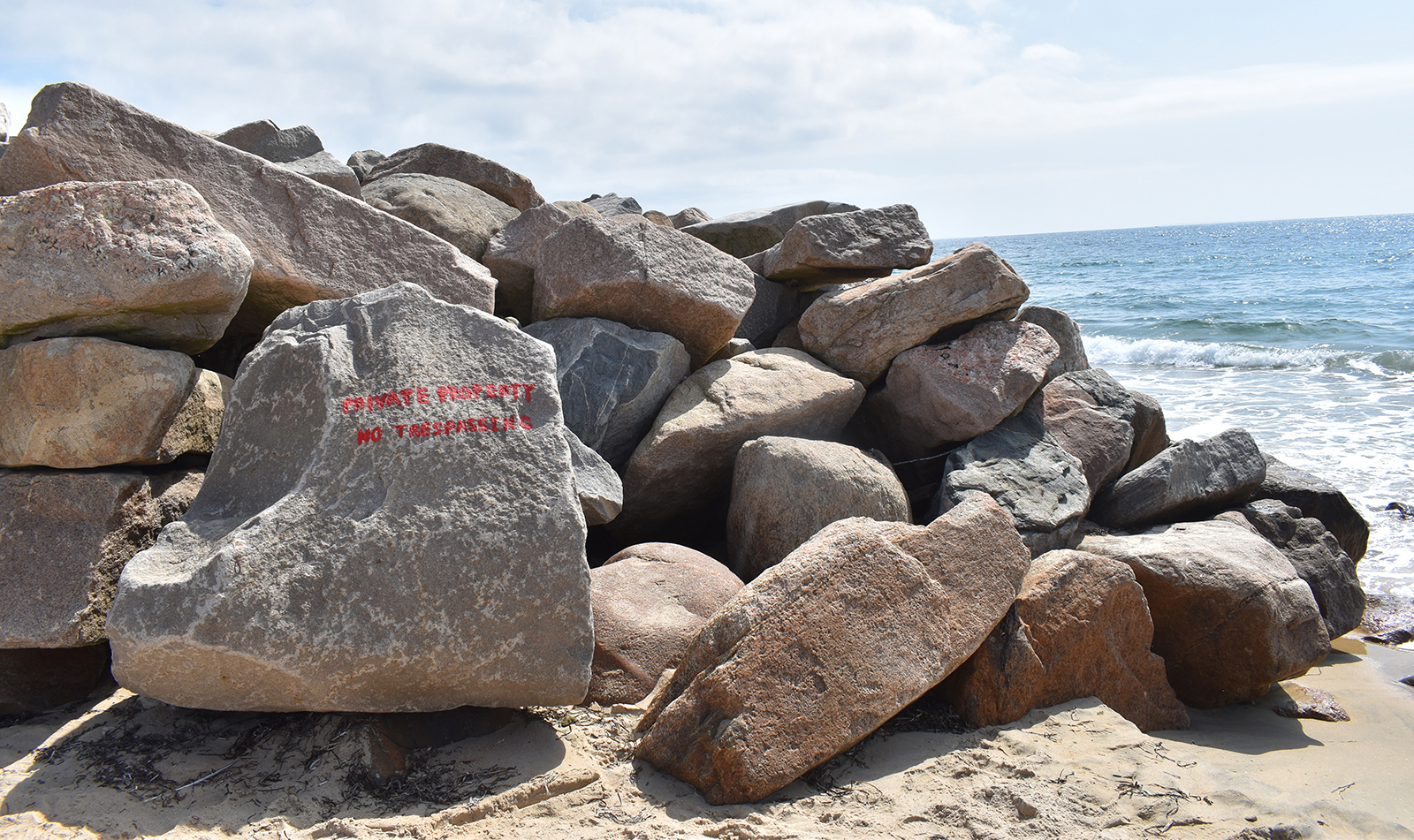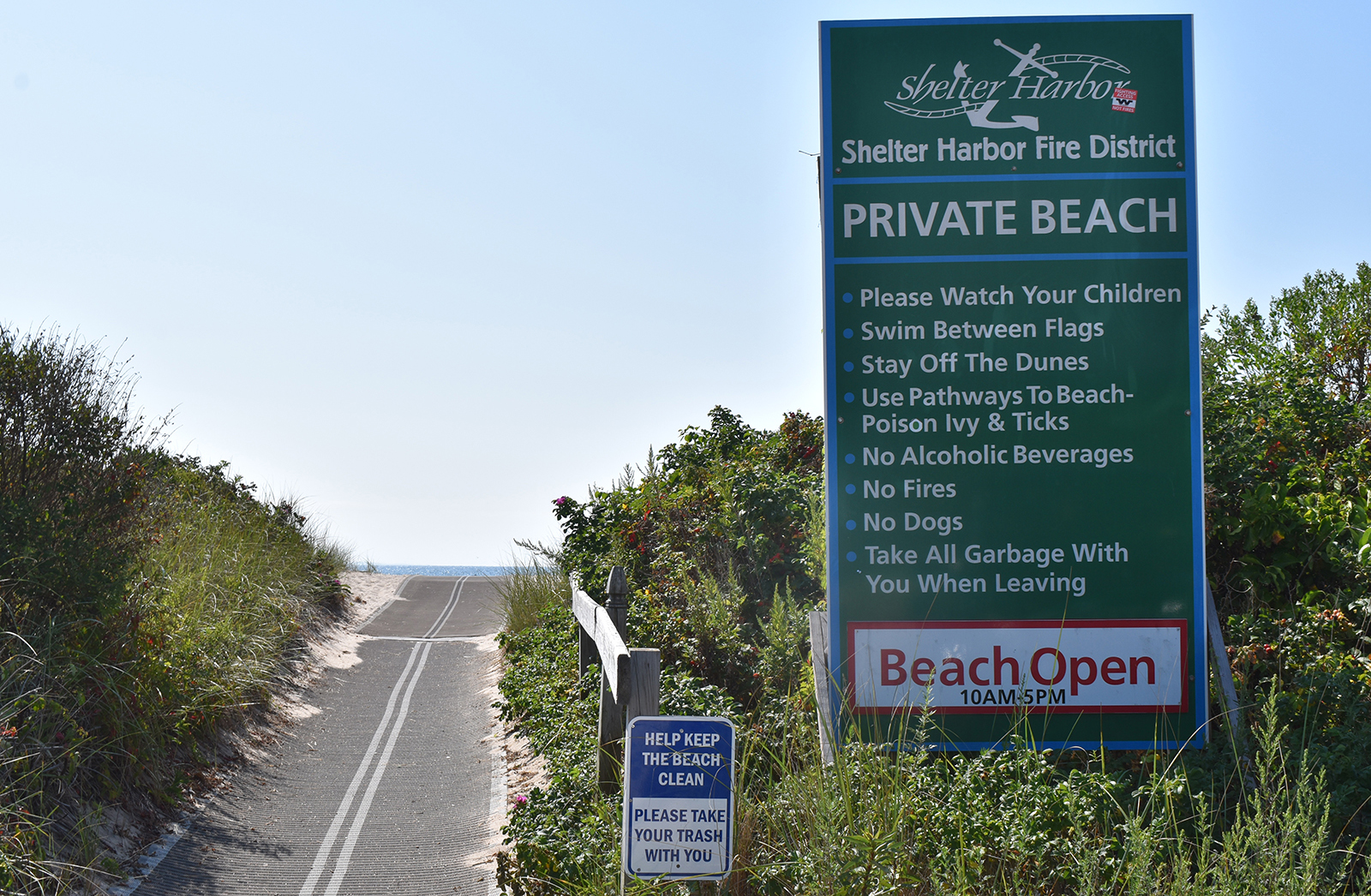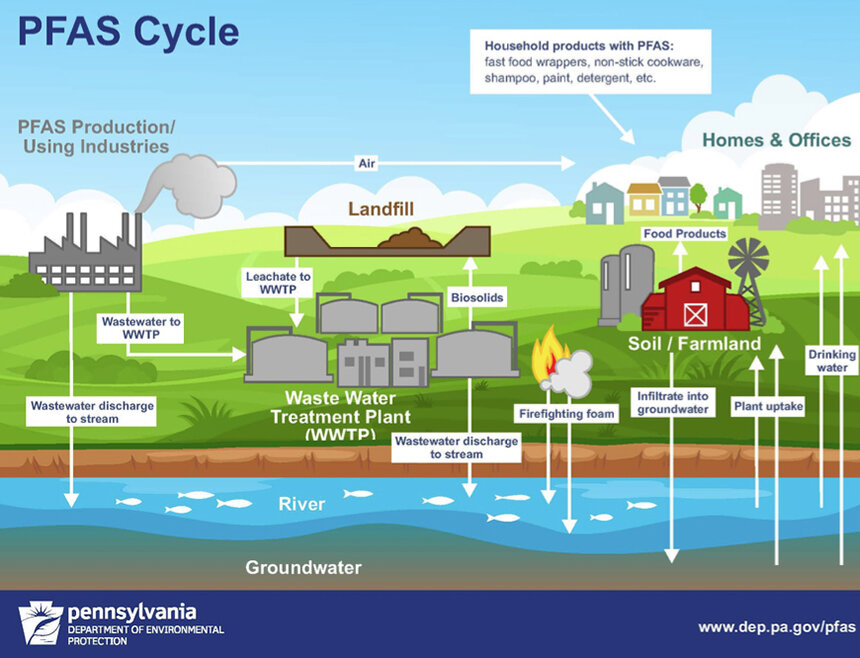On Guard: Public Access to Westerly Beaches Tightens
August 31, 2022
WESTERLY, R.I. — Thomas Micele lives less than 2 miles from what he calls “the most beautiful beach in Rhode Island,” but between 9 a.m. and 6 p.m. from mid-June to mid-September he and the vast majority of Ocean State taxpayers have no access. A guard blocks the entrance.
Micele has written to the Coastal Resources Management Council (CRMC) and the attorney general expressing his concern about the limited availability to Quonochontaug Barrier Beach, also called Weekapaug Beach.
In a Feb. 4 email to CRMC, he noted the Weekapaug Fire District is blocking access to the beach.
“They have a guard posted to be sure no one walks across the walkway to the beach,” he wrote. “Next to their beach entrance is a public right of way that is blocked by a fence. … It is on town property designated as a road on older town plats.”
Between June 15 and Sept. 15, the portion of Quonochontaug Beach owned by the Weekapaug Fire District can only be used by Weekapaug residents and their guests and by Shelter Harbor and Shady Harbor Fire District residents and their guests in leased areas, according to the Quonochontaug Beach Conservation Commission.
The commission also notes that from 6 p.m. to 9 a.m. anglers can access the shore over Weekapaug Fire District boardwalks for surf fishing, and clammers can access Quonochontaug Pond for clamming.
During that three-month summer period, the public can access the “Sand Trail” — a 37-foot-wide private/public path/road that leads to Quonochontaug Beach — and walk on the beach for nature walks, but “there shall be no swimming,” according to the commission, which was created to preserve, in as nearly as possible its natural state, one of the few remaining undeveloped barrier beaches in Rhode Island.
Micele, a retired educator, said he has been kicked off the beach because it was a few minutes past 9 a.m., and he said he has seen up to three guards patrolling the Sand Trail.
The mission of the Weekapaug Fire District, according to its homepage, is to provide fire protection and security to its homeowners and maintain beaches and roads within the district. The district, however, doesn’t actually fight fires, at least according to a story published last year by The Public’s Radio. The organization actually functions more like a homeowners’ association.
It also, at least according to a group of concerned residents, is illegally blocking a shoreline right of way, known as the Spring Avenue Extension, to keep the public from accessing 1.8 miles of what Dan King calls “pristine shoreline.”
A group called RI Coastal Access was created to cultivate public awareness and foster civic engagement for the preservation of the Ocean State’s coastline and state constitutional rights to shoreline access. One of the group’s initiatives is the controversy surrounding the Spring Avenue Extension.
In a document sent to CRMC’s legal counsel last September, Michael Rubin, a former assistant attorney general of Rhode Island, outlines what he believes is proof that the Weekapaug Fire District doesn’t have the right to control this shoreline access point.
The Weekapaug Fire District, however, continues to maintain it owns the disputed right of way. Both sides have filed memorandums with the state outlining their legal arguments.
ecoRI News reached out to CRMC about where the Spring Avenue Extension matter stands, but didn’t receive a response. In her Feb. 7 response to Micele’s email, Laura Dwyer, CRMC’s public educator and information coordinator, wrote the agency “has been aware of the issues in the Weekapaug Fire District for more than a year, and is currently working to address the issue.” She noted such a process “requires detailed and lengthy legal research.”
CRMC doesn’t have the authority to create new rights of way, so expanding public access to the coast requires identifying ones that already exist.
“There’s virtually no one out there on that beach in the summer,” said King, who surf fishes off Weekapaug Beach two or three times a week in the early morning, leaving well before the 9 a.m. curfew. “Look either way and it’s empty.”

Whittled down access
In late August, ecoRI News met with Micele, King, and Caroline Contrata on the back porch of Micele’s home on Quannacut Road. They spoke about the takeover of Weekapaug Beach by the Weekapaug, Shelter Harbor and Shady Harbor fire districts. They talked about how overall shoreline access in Westerly is increasingly being limited by the town, fire districts, and homeowners, to make summertime residents happy by keeping people like them away.
Besides Westerly’s two town beaches — Westerly Town Beach and Wuskenau Beach — and Misquamicut State Beach, they said most of the town’s other public access points to the coast are being blocked by a combination of practices and by apathetic town officials.
The three local residents said the public is largely forced to crowd itself onto some 500 yards of town beach and a half-mile of state beach, while the rest of Westerly’s attractive shoreline is essentially walled off for private use.
They rattled off a list of approaches that have been taken to squeeze access, and then we donned masks and got into Micele’s beige, 2017 Chrysler Pacifica to take a tour of the practices the driver said are being implemented to keep “us peons off their beaches.”
They said elected officials are bowing to the desires of wealthy property owners at the expense of the public.
Micele, a New Jersey native who moved to Westerly nine years ago, said the modus operandi is to not allow parking near shoreline rights of way. In Watch Hill, for example, the trio noted that where public access is available, signs are plastered about that say no parking, stopping or standing, thereby making it illegal to even drop someone off at a coastal right of way. The fine is $150, more than many tickets issued for speeding through the affluent coastal neighborhood.
In the rare instances where free shoreline parking is available in Westerly, it is often limited to 30 minutes.
“People can park in front of my home, but not in front of shoreline homes,” said Micele, noting that on Sundays the streets and roads around Watch Hill Chapel on Bluff Avenue are lined with parked cars that don’t get ticketed. “Why can’t I park there on a Monday?”
A growing number of security guards and signs warning “No Parking,” “No Trespassing,” “Cameras In Use,” and “Private Residents Only” are posted along the roads, streets, and pathways that lead to some of the most desirable stretches of Westerly’s coastline. Fences, boulders, and vegetation are used to mark territory, even if they infringe upon a public right.

“Private Property No Trespassing” is painted in red on a pile of rocks next to a home on East Beach. A sign posted roughly 50 feet from about a dozen public parking spots at well-guarded Weekapaug Beach alerts anglers, clammers, and walkers that the snack bar is only for guests of Weekapaug Inn and the Weekapaug, Shelter Harbor, and Shady Harbor communities. The free public parking spots are often used by inn guests and fire district residents.
A public access point at the north end of Waters Edge Road in Watch Hill is blocked by a fence and overgrown vegetation. At the road’s south end, there is public access and a grant-funded kayak rack, but parking anywhere near the right of way is prohibited.
The trio noted there is limited access to Quonochontaug Pond, a coastal lagoon in Westerly and Charlestown, despite the fact taxpayer money is used to dredge the waterbody behind the barrier beach that is off limits to the public for most of the summer.
At the Quonochontaug Breachway, also known as the Quonnie Breachway, they said a fence blocks access to the ocean side of the jetty.
At East Beach, parking is severely limited. According to the Weekapaug Fire District’s 2022 beach regulations, the district owns East Beach, as well as Fenway Beach, and they are for the “benefit and use” of the district’s property owners and their guests.
At Watch Hill Beach, it can cost up to $50 to park and it costs $12 per adult and $6 for children 3 and older to access the beach. Parking for Napatree Point can also be pricey, at least for beachgoers who don’t come by water.
King has lived in Bradford, a historic district in the towns of Westerly and Hopkinton, for 35 years. He said the local squeeze on public access began three decades ago and has recently picked up the pace.
“Access keeps getting tighter and tighter,” he said. “It gets more restrictive as the years go by.”
Contrata, who grow up in Ledyard, Conn., spent the late 1970s and early ’80s as a teenager exploring the Westerly coastline. She said much of the access she enjoyed as a teen has disappeared.
Micele said government-subsidized flood insurance and federal grants to raise coastal homes are taxpayer funded, “but we can’t get access to what we pay for.”
“There’s parking but no access and access with no parking,” he said. “That’s basically what we have in Westerly. All these beautiful beaches that nobody can get on.”
The contentious issue of shoreline access, however, isn’t limited to Rhode Island’s most southerly town. The matter has generated plenty of public interest during the past few years. A special House commission was even created to study the issue.
The Rhode Island Constitution guarantees the right to passage along the coast, but it doesn’t say the public has the right to walk across the shore above the mean high-water line or on private property to get there — the issue at the heart of the Spring Avenue Extension matter and one the House study commission was created to address.
The 12-member shoreline access study commission produced a bill (H8055A) that would have allowed residents to walk along the shoreline 6 feet landward from the identifiable seaweed line. The bipartisan legislation easily passed the House, but never received a committee hearing from the Senate Judiciary Committee. Senate President Dominick Ruggerio, D-North Providence, didn’t support the bill.





Let’s not forget that in June 2020, the Town of Westerly, in contravention of the town charter, posted signs requiring a Larkin Road parking pass at the public parking spaces on Spray Rock Road. When challenged, the town took the signs down and subsequently posted that the spots were public.
To put a human (and canine) face on the imitation tactics of the WFD, I very recently took my very elderly pooch for what I knew to be her last swim in Quonnie Pond. I had been taking her there for 14 years and never had a problem. It was 6:20 on a weeknight, and I was repeatedly told by the guard that I could not go on to the beach. I politely replied, repeatedly, that I knew the rules and had no intention of breaking them. If that weren’t upsetting enough, the guard questioned me about why I had such a big bag – as if I must be planning on going to the beach side. I had TOWELS to dry my dog off, tennis balls and lots of bags to pick up poop! This is coming from a resident who knows and always abides by the rules. It strikes me as nothing short of harassment.
The continual Harassment of Rhode island residents by private security is appalling . I have continued to use the beach and i do not follow the weekapaug fire districts rules.I follow state law and statute. It gets better though. I cant imagine there was a dispute when the recent yacht club was built. What an eye sore.
i can t imagine the rent a cops have any legal authority. they can t physically restrain someone – that would be an assault. i d ignore them and just walk past them.
The oligarchy has to be catered to because they pay a lot of taxes on their mansions and make substantial political contributions to the people that sit on the Coastal Resources Management Council.
Most of the members of this council are members of the oligarchy that have little or no experience as environmentalists.
One thing they forget is that it is one person one vote.
Quit voting for people that perpetuate this injury of denying access to Rhode Island’s most precious resource our oceans.
Before you vote ask the fans where they stand on the issue of beach access for all residents like our State Constitution guarantees us.
If they answer in the negative or avoid the question or say its a complicated issue tell them your vote is a complicated issue and their opponents are looking like the ones they will vote for.
Enough is enough. Time to demand our Constitution rights! Vote everyone that wishes to deny them out of office.
related to voting, my State Senator, Senate resident Ruggerio refused to let the Senate even have a hearing on the bill H8055 that clarified our constitutional right to shore access that passed the House unanimously. Ruggerio did not reply to my message about this issue, and told reporters the issue didn’t even make his “radar.” Fortunately this time he has a serious primary opponent
Great story Frank.
The Quonochontaug Beach Conservation Commission does not legally exist as far as I can tell….
Also Article I, Section 16 of the RI Constitution is very significant. It blows away the takings argument at the state level. It states in part:
“… in furtherance of the protection of the rights of the people to enjoy and freely exercise the rights of fishery and the privileges of the shore, as those rights and duties are set forth in section 17, shall be an exercise of the police powers of the state, shall be liberally construed, and shall not be deemed to be a public use of private property.”
Some fire districts have police powers. Put enough money in your pocket to post bail – just in case!
Great story. These homeowners are sickening.
Thank you for bringing this well written story to the attention of the public. I have personally experienced and witnessed the Rhode Island shoreline access disappearing continuously over the last 48 years. Barrington is another city with issues, and shoreline restrictions. Twenty five to thirty years ago I gave up trying to find a legal parking spot to fish at Rumstick Point where I fished without any hassles at 17. Violence is not the solution, but if this unlawful and unfair restriction continues fist fights and “knuckle sandwiches” will definitely become the daily routine. Law abiding citizens trying to fish or enjoy the Atlantic Ocean only have so much patience for injustice. Unrestricted access to the shoreline is the only fair solution. Our elected officials need to get on board and do the right thing for the general public. The fences and guards need to go away.
It amazes when the Westerly Police Dept. Will not give a parking ticket in Misquamicut to people who park on the other sides of hedges to access the beach. Per WPD, “the car wheels are not on the pavement”. The cars are not the owners or renters. When I said then I can do that in Watch Hill to access the beach?” I was told no. I replied, “ the residents of Misquamicut have to live by different rules with regard to illegal parking then Watch Hill?” He stated “You can’t park on grass on the other side of hedges in WH”. I replied, “ but they park on our narrow streets and block access to Emergency Vehicles”? The Misquamicut Business Association, is so pro business but if out of towners are parking on sides of streets snd illegally parking to access the beach, these people are taking money away from out businesses with regard to paying to park. Mr. Cooke and they MFD turns a blind eye to this issue. The beaches should be free for all not a select few. However, illegally parking on private property on the grass on the tree belt should not occur. We should have shuttles to the beach and the police need to patrol like they did in the 80’s to stop public drinking, littering and urinating along with dogs on the beach during the day. We pay a lot for taxes living by the beach but we are 2nd class citizens in Misquamicut if you don’t live right in the beach.
I just want to have access to go surf and return to shore safely.
If I drift into a costal owners beach back yard and have no way to a right of way I need to cross through somebodies yard because there are so few ROWs.
Not haft to paddle back out and around sea walls and boulders.
Look what just happen to Floridas beaches. RI is next.